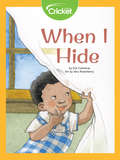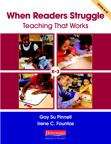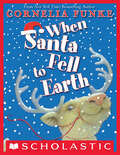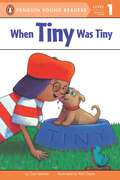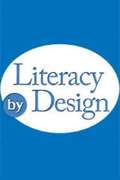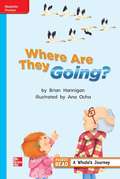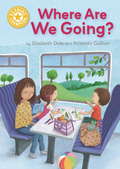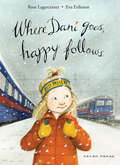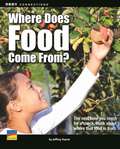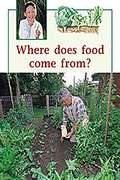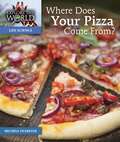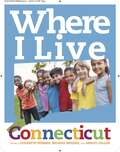- Table View
- List View
When Marian Sang: The True Recital Of Marian Anderson
by Pam Muñoz Ryan Brian SelznickNIMAC-sourced textbook
When Readers Struggle: Teaching That Works
by Gay Su Pinnell Irene C. FountasWhen Readers Struggle: Teaching That Works filled with specific teaching ideas for helping children in kindergarten through grade 3 who are having difficulty in reading and writing.
When Santa Fell to Earth
by Cornelia FunkeA crash-landing puts Christmas in peril in this quirky, funny, and heartwarming holiday classic from the New York Times–bestselling author of Inkheart.Scared by a storm, Twinklestar, the least reliable reindeer, bolts—causing Santa and his sleigh to crash-land. And though Santa has dropped into a friendly neighborhood, he’s not safe: Jeremiah Goblynch, the ruthless new leader of the Council of Yuleland, is determined to put an end to children’s wishes and turn the holiday season into his own personal moneymaking scheme. As the last REAL St. Nick around, only Santa stands between Goblynch and his grinchlike plan. With the help and hope of kids Charlotte and Ben, Santa must face Goblynch and his Nutcracker goons to save Christmas!“Wonderfully imaginative details, adventure, danger, and a brave young Santa who fights to preserve all that is magical and special about Christmas make this a perfect read over a mug of hot chocolate on a cold winter’s night.” —School Library Journal“The humor, plus some unusual character types, sets this apart from the general run of holiday tales.” —Kirkus Reviews
When Tiny Was Tiny (Tiny)
by Cari MeisterWhen Tiny was a puppy, he fit inside a shoe. He fit in a bag, and he even fit in a pocket. Then Tiny grew, and now he is too big for his doghouse. He is too big to lick his friend's face--yuck! Young readers will enjoy this sweet, funny story about a very big dog who was once a tiny puppy. Not since Clifford has a big dog been so appealing!
When We Are Free (Fifth Edition)
by Timothy G. Nash Dale C. Matcheck Evgeniy I. Gentchev Alexander WattsThis book is about freedom and individual responsibility.
When Wishes Go Wrong (Jeanie & Genie #6)
by Trish GrantedIn the sixth book of the Jeanie & Genie series, something is off with Willow&’s wish granting, which could spell big problems for Jeanie and Willow.Willow Davis is a genie. And, as a genie, she grants only the most sincere wishes. But something strange is going on because suddenly anytime anyone says &“I wish,&” Willow grants that wish. This means big problems for Jeanie and Willow. Can the girls figure out the problem? Or is there something more…out-of-this-world going on? With easy-to-read language and illustrations on almost every page, the Jeanie & Genie chapter books are perfect for emerging readers.
When the Wind Blows and the Sun Shines: Based on an Aesop Fable
by Alison Hawes Bee WilleyNIMAC-sourced textbook
Where Are We Going? (Into Reading, Level D #43)
by Patricia Brennan Chi ChungNIMAC-sourced textbook
Where Are We Going?: Independent Reading Yellow 3 (Reading Champion #132)
by Elizabeth DaleReading Champion offers independent reading books for children to practise and reinforce their developing reading skills.Fantastic, original stories are accompanied by engaging artwork and a reading activity. Each book has been carefully graded so that it can be matched to a child's reading ability, encouraging reading for pleasure.Independent Reading Yellow stories are perfect for children aged 4+ who are reading at book band 3 (Yellow) in classroom reading lessons.In this story, the family is on a train ride and the children are disappointed not to be able to get off and do all the things they can see from the window. But when they arrive at the seaside, they will be able to do everything!
Where Dani Goes, Happy Follows (My Happy Life #6)
by Rose LagercrantzWhat do you do if your best friend lives in another city and the adults can't keep their promises about when you'll see her? You have to sort it out for yourself! Dani's father is away and Dani is staying with her grandparents. When she is invited to Ella's party, she thinks of the world's best gift for the world's best friend: she, Dani, will be the present! Her grandmother agrees—if she's brave enough to take the train alone. So Dani sets out on a journey all by herself.
Where Does Our Food Come From? (Rigby Leveled Library, Level Q #27)
by Peter MillettNIMAC-sourced textbook
Where Does Your Pizza Come From?: Explore The World Level H Set
by Michèle DufresneNIMAC-sourced textbook
Where Does the Garbage Go? [Grade 3]: Soar To Success Student Book (Houghton Mifflin Reading: Intervention Ser.)
by Paul Showers Randy ChewningNIMAC-sourced textbook
Where Fear Lives (Fountas & Pinnell Classroom, Guided Reading Grade 5)
by Jill Rubalcaba Kanako YuzuruNIMAC-sourced textbook
Where Is Fish?
by Abby Seaborne George HamblinThe fun and excitement of English and Language Arts learning continues in Grade 2 of Reading Street. This comprehensive and dynamic curriculum for homeschooling is geared toward young children who have some foundational English and Language Arts knowledge and are ready to strengthen their skills. Comprised of engaging activities, challenging content and weekly quizzes, Reading Street: Grade 2 is the next step in your child's path toward becoming a lifelong learner and reader. As with all Reading Street products, the Grade 2 system is formatted to help students meet certain age-appropriate goals. After completing this English and Language Arts homeschool program, your child should be able to: Read and comprehend two-syllable words. Identify common prefixes (such as pre-, un-, or re-) and suffixes (such as -able, -ad and -er). Correct mistakes made when reading out loud. Read books with two or more chapters. Understand the structure of stores (i. e. beginning, middle and end). Start selecting reading materials based on his/her own interests. Identify the "who," "what," "when," "where," "why" and "how" of the text. While the goals of second Grade English and Language Arts are numerous, Reading Street will help you craft engrossing lessons. Your child will garner important English and Language Arts skills while completing a workbook, reading stories and poems, and taking assessments. Planning these lessons will be easier than ever, as all Reading Street systems are broken down into weekly Big Ideas. All the work your child does on a given week is formulated around that single concept for an organized and challenging curriculum. With six easy-to-follow units, Reading Street: Grade 2 is the perfect tool for homeschooling parents. Your child will enjoy the reading selections and activities, and you'll love to see your student growing into a knowledgeable individual. We're confident that this product is the right one for you. For more information on the specific materials found in Grade 2 of Reading Street, check out the Features and Benefits page.
